Polyester BCF-yarns – All maritime navigation in danger on Suez Canal for Houthi attacks 15-01-2024
Polyester BCF-yarns
Naphtha rPET – Mercedes: Solid-State Batteries “May Not Be Necessary” Solid-state batteries? For Mercedes, they might no longer be necessary given the progress of lithium-ion batteries
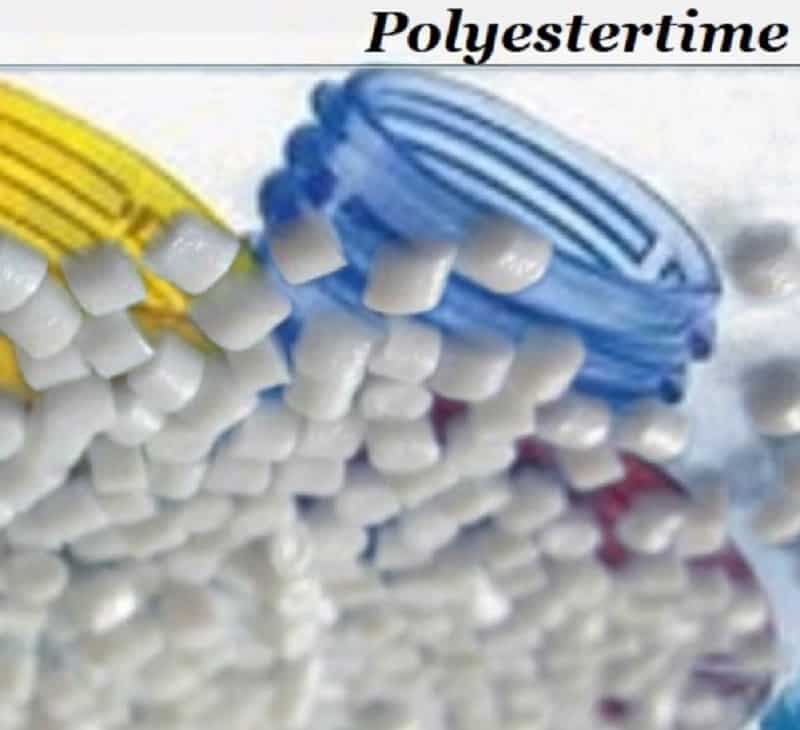
Crude Oil Prices Trend
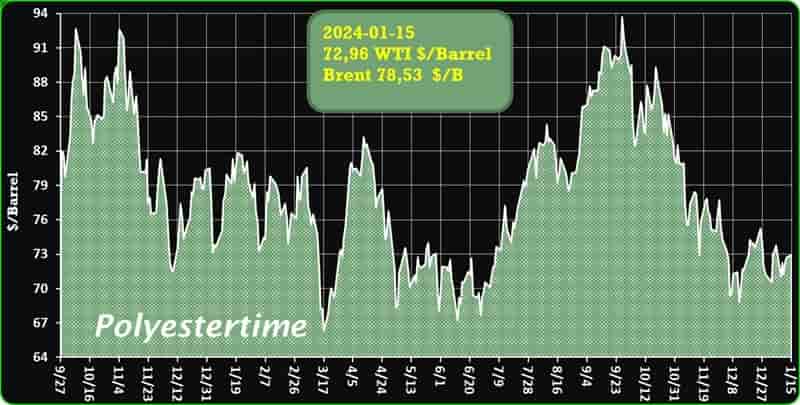
Crude Oil Prices Trend by Polyestertime
All maritime navigation in danger on Suez Canal for Houthi attacks
The Suez Canal, one of the world’s most important waterways for global trade, is facing a serious threat from the Houthi rebels in Yemen, who have launched a series of attacks on shipping vessels in the Red Sea. The attacks have caused major disruptions and delays for cargo and oil shipments, as well as increased security risks and costs for the maritime industry.
What are the Houthi attacks?
The Houthi rebels are an Iran-aligned group that have been fighting a civil war against the internationally recognized government of Yemen since 2014. They control most of the western coast of Yemen, including the port of Hodeidah, which gives them access to the Red Sea and the Bab al-Mandab Strait, a narrow chokepoint that connects the Red Sea to the Gulf of Aden and the Indian Ocean. Polyester BCF-yarnsSuez Canal attacks
The Houthis have claimed responsibility for several attacks on ships in the Red Sea, using drones, missiles, and mines. They have said they are targeting ships linked to Israel or bound for Israeli ports, in solidarity with Hamas in its conflict with Israel in Gaza. However, many of the attacked ships have had no connection to Israel, and some have been carrying humanitarian aid or civilian passengers.
The Houthis have also seized a Japanese-operated vehicle carrier, the Galaxy Leader, on 19 November 2023, along with its 25 crew members. Suez Canal attacks
The ship is reportedly linked to an Israeli businessman, and the Houthis have demanded a ransom for its release. Polyester BCF-yarns

B.I.G. Yarns, A New European Producer Of PET BCF Yarns For Automotive Carpet
To expand its support for high-end and luxurious automotive interiors, B.I.G. Yarns has completed its first industrial production runs of virgin polyester BCF yarns for automotive carpet to complement its line of polyamide PA6 superior yarns.
There is a growing market in PET for automotive interior applications, with polyester allowing automotive OEMs and Tier 1 to develop products that, from the outset, consider eco-design by building MONO-polymer carpets and flooring that are 100% recyclable at End of Life (EOL ). Polyester BCF-yarns
These materials are helping to ensure improved and more sustainable EOL recycling of electric vehicles that are driving the future of the car industry.
The new PET BCF Yarns offer high-performance for automotive carpets, including abrasion and stain resistance, and durability, passing all stringent automotive tests including the Taber test for abrasion performance, compressibility and recovery ability test, light fastness in automotive (DIN EN ISO 105-B06) and VOC (fogging) according the VDA 278 test on VOC and FOG emission. The yarns can be color solution dyed, have a dTex between 1300 – 1500, 81 filaments and are ideally for mats with a composition of 400 to 800 gram per m², while the yarns for molded carpets have a dTex of 1200, 144 filaments for 380 gram per m². Polyester BCF-yarns
“As the industry continues its transition towards circularity, making the right material choice is crucial from the outset to ensure the best possible eco-design and recyclability. Our newcomer, PET BCF yarns, brings virgin material to automotive carpets, creating a new systemic approach towards MONO-polymer-based automotive applications,” said Glenn Hyzak, Global Sales Director Yarns.
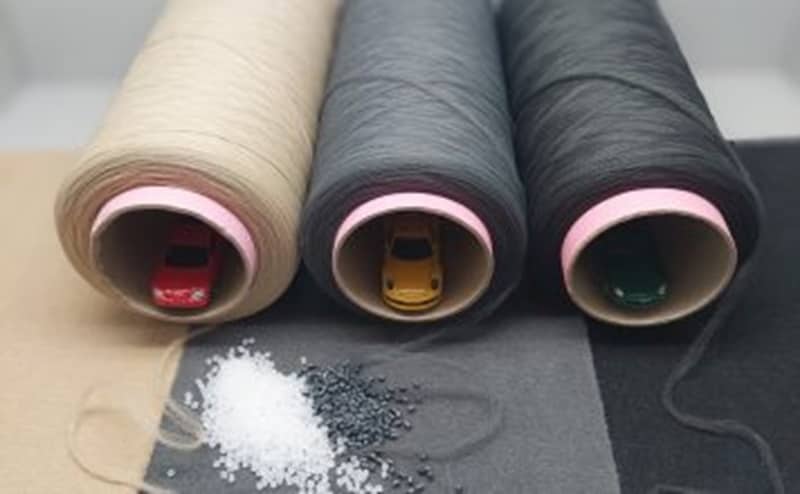
Stellantis Ventures, the venture capital fund of Stellantis N.V., has announced its strategic investment in Tiamat, a French company specializing in sodium-ion battery technology
Sodium-ion batteries are anticipated to bring about cost reductions, increased sustainability, improved low-temperature performance, and faster charging capacity compared to current lithium-ion battery technology.
This investment aligns with Stellantis’ commitment to providing clean, safe, and affordable mobility as part of its Dare Forward 2030 strategic plan. The Dare Forward 2030 plan focuses on achieving net-zero carbon emissions by 2038 and emphasizes electric propulsion as a key pillar. Polyester BCF-yarns
The sodium-ion battery technology developed by Tiamat is highlighted for its lower cost per kilowatt-hour and the absence of lithium and cobalt. The abundance of sodium as a raw material is seen as a strategic advantage, offering greater sustainability and reducing dependence on scarce resources.
Ned Curic, Chief Engineering and Technology Officer of Stellantis, emphasized the importance of finding sustainable and affordable battery options as part of their strategic plan. The goal is to meet customer expectations for zero-emission vehicles that provide autonomy, performance, and convenience. Polyester BCF-yarns
As part of the Dare Forward 2030 plan, Stellantis aims to transition to electric propulsion, targeting 100% of Battery Electric Vehicle (BEV) passenger car sales in Europe and 50% in the United States for both BEV passenger cars and light commercial vehicles by 2030. To achieve this, Stellantis is securing approximately 400 GWh of battery capacity and investing in various alternative energy storage technologies.
Tiamat, a spin-off of the French National Center for Scientific Research (CNRS), plans to use the investment to construct a sodium-ion battery plant in France. Initially, the batteries will be used for electrical appliances and stationary storage applications, with plans to expand production for second-generation products specific to Battery Electric Vehicles (BEV) in the future. Polyester BCF-yarns
The investment in Tiamat is part of Stellantis’ broader strategy to support innovation in battery technologies and move towards a zero-carbon emission future.

NEVEON has successfully finalized the sale of its OEM automotive business to the Trèves Group of France, following the receipt of antitrust approval on December 31, 2023
The economic transition of the divested entities, which include Greiner Perfoam GmbH in Enns and Linz (Austria), Greiner Perfoam s.r.o. in Tabor and Valašské Meziříči (Czechia), Greiner Perfoam Automotive Components, S. de R.L. de C.V. in Mexico, and the joint ventures Shen-yang Greiner Automotive Components Co., Ltd. and Tianjin Greiner Automotive Components in China, is now complete. Polyester BCF-yarns
This strategic move signifies NEVEON’s exit from the OEM automotive sector, allowing the company to concentrate on its vertically integrated foam core business in Living & Care (mattresses, upholstered furniture, and healthcare applications) and Mobility & Specialties (including Aviation, Railway, and various specialized foam applications such as boiler insulations, technical foams, and composite foams).
Simultaneously, Henning Frings, aged 35, assumes the role of Executive Vice President for the Mobility & Specialties business unit. He replaces Martin Etzlstorfer, who remains in his position as Managing Director of Perfoam within the Trèves Group. Jürgen Kleinrath, NEVEON’s CEO, expresses confidence in Frings, recognizing his exceptional management skills and welcoming his appointment from within the company. Polyester BCF-yarns
Frings, who holds an MBA from the University of St. Gallen, brings a wealth of experience from his tenure at international companies such as Amcor Flexibles, Jindal Films, and Edelmann Group. Having joined NEVEON in 2020 as Director of Corporate Development and later becoming the General Manager for Aviation & Railway in 2022, Frings expresses eagerness to contribute to NEVEON’s success in his new role, overseeing areas like Aviation, Railway, Turnkey Solutions, and Base Materials.
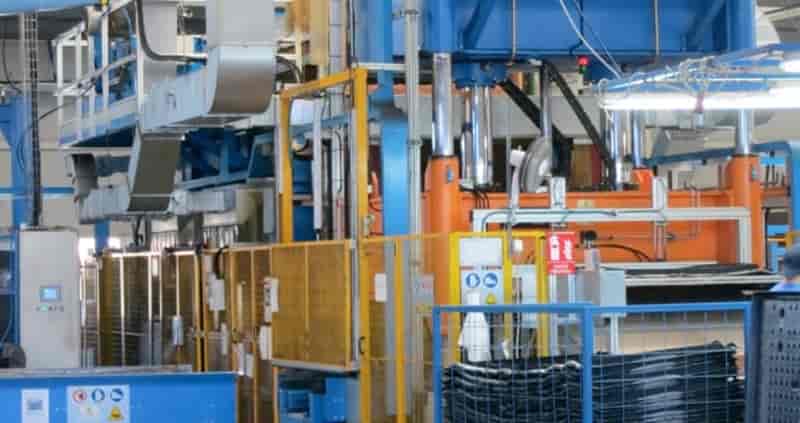
Polymer Process, a prominent authority in the field of polymer technology, has recently unveiled an extensive examination elucidating the revolutionary impact and diverse applications of superabsorbent polymers (SAPs)
This groundbreaking analysis provides in-depth insights into the distinctive properties and chemical composition of SAPs, spotlighting their exceptional capacity to absorb and retain substantial amounts of water. Polyester BCF-yarns
Key Observations from Polymer Process’s Study
Unprecedented Water Absorption and Retention: SAPs exhibit the remarkable capability to absorb and retain significant quantities of water, distinguishing them across various industries.
Diverse Types with Distinctive Characteristics: The study accentuates various types of superabsorbent polymers, each tailored with unique features catering to specific applications. Polyester BCF-yarns
Chemical Composition: Predominantly composed of polyacrylate compounds, SAPs contribute to their elevated absorbency and operational efficiency.
Porous Architecture for Liquid Absorption: The review elucidates how the porous structure of SAPs plays a pivotal role in facilitating effective liquid absorption.
Versatile Applications: Superabsorbent polymers find diverse applications in agriculture, personal care, industrial processes, and waste management, showcasing their adaptability across sectors. Polyester BCF-yarns
Revolutionizing Industries through Advanced Polymer Technology
Polymer Process’s comprehensive review underscores the transformative impact of superabsorbent polymers on contemporary technology and industry. In agriculture, SAPs play a crucial role in water conservation and enhancing crop yields. Within personal care products like diapers and adult incontinence items, SAPs contribute to heightened comfort and absorbency.
In industrial settings, SAPs facilitate fluid control and spill management, while in waste management, they aid in containing and processing liquid waste. The review accentuates the potential of SAPs to revolutionize these sectors through innovative applications and sustainable practices, positioning them as key players in the advancement of modern industries. Polyester BCF-yarns

Prime Minister Edi Rama has elucidated that the textile industry’s crisis cannot be solely attributed to the appreciation of the Lek and the depreciation of the Euro in the currency exchange
He stressed that viewing the predicament through the lens of currency fluctuations is fundamentally flawed. Rama dismissed the notion that the crisis arose solely due to the strengthened Lek and the resultant shift in the Euro’s dynamics, asserting that relying on labor as a competitive advantage is an antiquated strategy. Polyester BCF-yarns
In urging a paradigm shift, the government leader emphasized that fashion companies must alter their approach, cautioning against expecting governmental intervention in the form of “serums.” Rama emphatically declared that no magical remedy exists, and taxing measures cannot artificially prolong the life of an unsustainable entity. He characterized the industry’s plight as a form of clinical death but underscored that solutions exist for entrepreneurs willing to adapt and change the game.
The Prime Minister emphasized the need for resilience and adaptation, citing examples within the industry where successful transformations have occurred. He highlighted that these changes are not merely theoretical discussions but tangible instances where actors within the textile sector have embraced adaptation, becoming competitive entities in the contemporary market. Polyester BCF-yarns
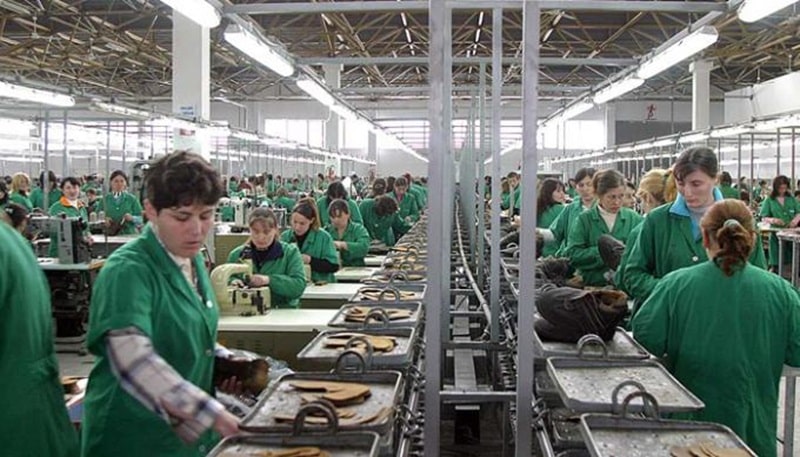
Technology allows for fibers to be separated and re-used
Recycling used by still-usable clothing is a great thing – but when textiles are torn, hopelessly dirty or worn, they have to be thrown out. Many types of clothing today can’t be recycled because natural fibers like cotton or wool are mixed with synthetic ones, and they have to be burned or buried. Polyester BCF-yarns
When you go running in the woods in your running tights, elastane — also known as spandex or Lycra, a synthetic fiber that is exceptionally stretchable – is often used in combination with other fibers. That is why athletic wear fits you so comfortably; is adopts to your body.
But when these synthetic fibers are mixed with cotton, wool, nylon or others, as is the case in many clothes today, the clothes become almost impossible to recycle. It is extremely difficult to separate out the different ones.
This may change, says Assistant Prof. Steffan Kvist Kristensen from the Interdisciplinary Nanoscience Center at Denmark’s Aarhus University. Polyester BCF-yarns
Together with a number of colleagues, he is behind a new technology that can separate out fibers in mixed fabrics. They just published their findings in the journal Green Chemistry under the title “Selective chemical disassembly of elastane fibers and polyurethane coatings in textiles.”
“We’ve developed a method to remove elastane completely from nylon. We’re not quite there yet with cotton, because some of the cotton fibers are broken down in the process, but we believe that, with some minor adjustments, we can solve this problem,” he declared. “In other words, we can disassemble the fabric so that we can recycle far more textiles in the future.” Polyester BCF-yarns
Is it easy to separate fibers?
It is not easy to separate elastane and other fibers once they’ve been woven together. Clothing is made by winding the main fibers such as nylon or cotton around the elastane fibers, which consist of long chains of molecules. The fibers break apart only if we break the long chains of molecules, Kristensen, explained.

Polyester BCF-yarns
